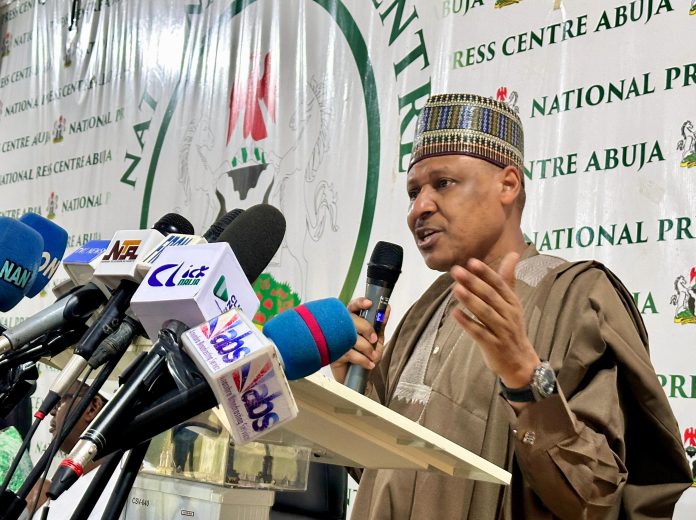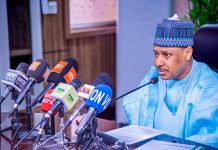SPEECH BY THE HONOURABLE MINISTER OF INFORMATION AND NATIONAL ORIENTATION, MOHAMMED IDRIS, fnipr, DELIVERED AT A PRESS CONFERENCE TO COMMEMORATE NIGERIA’S 65TH INDEPENDENCE ANNIVERSARY, HELD AT THE NATIONAL PRESS CENTRE, RADIO HOUSE, ABUJA, ON MONDAY, SEPTEMBER 20, 2025
Protocol.
It is heart-warming to join millions of Nigerians at home and abroad to bear witness to yet another monumental commemoration for our dear country: our 65th Independence Anniversary.
Sixty-five is a number associated with the gemstone known as sapphire—which symbolizes loyalty, trust, truth, nobility, sincerity, beauty and wisdom—all of which happen to be defining qualities of the Nigerian soul and spirit.
October 1 every year represents a milestone that enjoins us, even as we celebrate, to take stock of our journey in nationhood, to weigh the present, and to rally around a renewed purpose centred on repositioning our nation for a greater future.
As we mark this 65th year since our Independence from Great Britain, we are all witnesses to the remarkable reforms taking shaping at a pace never before seen. President Bola Ahmed Tinubu, GCFR is doing the needful; a committed, courageous and visionary leader dismantling stubborn cogs in the wheel of our national progress.
Under the Renewed Hope Agenda, and its Eight (8) Priority Areas, President Tinubu is laying the building blocks for a national renewal anchored on prosperity, peace and unity. At this point in time, our collective participation in nation building is critical to the sustenance of the progress being made.
That is why the theme of this 65th Anniversary is “All Hands On Deck”—a direct and heartfelt call to all Nigerians and our friends and partners around the world to show understanding and to commit to supporting these landmark reforms.
Our trade surplus continues to grow, with an increasing share of contributions from the non-oil sector. Declining inflation, a strengthening currency, falling food prices, growing external reserves—all of these are more eloquent testament that we are on the right track.
From January 2026, we will commence implementation of the Tax Acts quartet, which will expand our nation’s revenue base while simultaneously simplifying tax collection and lessening the burden on our people. These new tax laws represent a huge leap forward for the Nigerian economy and for business, entrepreneurship and investment.
With more revenue at its disposal, on account of the reforms, the Tinubu administration is investing heavily in the key components that will catalyse our collective growth and development: health, education, infrastructure, agriculture, energy security, regional and grassroot development, small business, youth, and national security.
As we speak, more than 500,000 students of tertiary institutions – universities, polytechnics, and colleges of education, are already benefitting from the National Education Loan Fund (NELFUND), in which tuition and upkeep fees are paid for by the Federal Government. This is unprecedented in our history.
Under President Tinubu, our nation is gradually recapturing the spirit of people-centered, grassroots development, through the establishment of five new regional development commissions and a supervising federal ministry for regional development.
We are in the middle of a road and transport infrastructure revolution, of which the flagship initiative is the one comprising the Presidential legacy highways, designed to connect Nigeria’s geopolitical zones, enhance national integration and unlock new economic corridors.
These landmark road projects are the 1,068-kilometre Sokoto-Badagry Superhighway; the 750-kilometre Lagos-Calabar Coastal Highway; the 477-kilometre Trans-Saharan Highway traversing Calabar, Ebonyi, Kogi, Benue, Nasarawa, and the FCT; and the 422-kilometer Akwanga-Jos-Bauchi-Gombe Expressway.
Complementing these are the high-impact rail projects: the Kano-Kaduna standard gauge rail, and the renewed push for the rehabilitation of the Eastern Corridor of the rail line from Port Harcourt to Maiduguri.
In the energy sector, this administration has revived the 255MW Kaduna Power Plant and we are determined to bring it completion. The Presidential Power Initiative (aka Siemens power project) is on course, as is the Presidential Metering Initiative, a vital collaboration between the Federal and subnational governments, which will deliver 7 million smart meters to close the country’s metering gap by 2027.
Currently, Nigeria is home to the implementation of one of the world’s largest distributed renewable energy projects—the Distributed Access through Renewable Energy Scale-up (DARES) project, a $750 million World Bank supported program that will deliver clean and off-grid electricity to more than 17.5 million Nigerians.
In oil and gas, the progress is equally unprecedented. We have seen a steady increase in oil production to meet our OPEC quota, and an equally steady reduction in oil losses to a 16-year low. Gas flaring is also at an all-time low, while new investments are flooding in to scale up gas exploration, processing and distribution. New investments in deepwater oil and gas exploration have exceeded five billion dollars.
We are advancing the AKK Gas Project and other critical gas pipelines, while frontier basin oil and gas exploration has resumed with the drilling of three oil wells in the Kolmani region of Bauchi and Gombe States.
In solid minerals and mining, we have welcomed investments such as the $50 Million ASBA Lithium Plant in FCT, and the $600million Avatar Lithium processing Plant in Nasarawa State. Between 2023 and 2024, royalties earned by government on solid minerals more than doubled, reflecting the success of our diversification efforts.
In healthcare, over 1,000 primary health care centres have been rehabilitated across the country, underscoring the administration’s commitment to human capital and social infrastructure.
Recently, the Federal Government, through the Ministry of Health and the Nigeria Sovereign Investment Authority, has commissioned three advanced and world class oncology centres as part of a broader push to expand health infrastructure in the country. The commissioned cancer centres are located at the University of Benin Teaching Hospital (UBTH), Federal Teaching Hospital Katsina, (FTHK), and the University of Nigeria Teaching Hospital (UNTH).
Another three new centres are nearing completion at the Jos University Teaching Hospital (JUTH), Lagos University Teaching Hospital. (LUTH), and the Ahmadu Bello University Teaching Hospital, (ABUTH).
Contrary to the perception being pushed in some quarters, this administration has demonstrated uncommon commitment to balanced and inclusive development since assuming office. The distribution of capital projects under President Bola Ahmed Tinubu is equitable. No region is taking a back seat.
Local Government Areas are being fiscally reintegrated as catalysts for growth and development, with the financial autonomy that the President is determined to fully operationalize.
Today, all State Governments now receive, from the federation account, multiples of the revenue they used to get, thanks to the increased headroom from the oil subsidy removal. Subnational governments are now able to do a lot more, and with less debt.
Beyond these, the Federal Government is actively going further to support various subnational infrastructure projects, like the light rail projects in Kano and Kaduna States, for which funding to the tune of ₦150 billion and ₦100 billion respectively has been secured.
President Tinubu has also established the Federal Ministry of Livestock Development to harness our underutilised potential and transform Nigeria’s livestock sector into a sustainable and globally competitive industry. In addition, to spur agricultural production, the Bank of Agriculture has been recapitalised to the tune of N1.5 billion, and is regarded as the most significant boost to agricultural financing in Nigeria.
This is the more reason why the ‘All Hands-on Deck’ message is apt and timely—henceforth no tier of government has any excuse not to fully pull its weight in this collective task of comprehensive economic growth and development.
Distinguished guests, ladies and gentlemen,
For 65 years, Nigeria has charted an extraordinary journey of growth and resilience, evolving in politics, economy, democracy, and military strength. Our nation has not only stood as a beacon of hope for its citizens but has also emerged as a rallying point for the entire Black race across the globe, embodying the spirit of unity, courage, and leadership.
Nigeria played an audacious pioneering role in the liberation and independence movements of several African nations, particularly during the transformative decades of the 1960s to 1980s.
Through unwavering political support, skillful diplomacy, and, at times, strategic material assistance, Nigeria stood shoulder to shoulder with those fighting for freedom and self-determination.
Various African countries bear testament to Nigeria’s enduring commitment to their struggles for independence. Our solidarity went beyond words; it was a demonstration of Africa rising together, united against oppression and colonial subjugation. We stood—and continue to stand—firmly in our belief that our continent, Africa, has come of age.
Nigeria also led the charge in mobilizing West African nations to forge a common front through the Economic Community of West African States (ECOWAS), advancing the cause of regional integration, economic cooperation, and collective security. Through platforms such as ECOMOG, Nigeria contributed both men and material resources to restore peace and stability in countries like Liberia and Sierra Leone, which showcased our commitment to regional harmony and the protection of human dignity.
Today, through the Technical Aid Corps, we continue to assist dozens of countries in Africa and beyond, with Nigerian experts and technical support. On the democratic front, Nigeria has been a vanguard of constitutional governance on the continent. Our insistence on the restoration and preservation of democracy across West Africa and beyond stands as a watershed, reinforcing the principle that true progress is anchored in people’s participation and the rule of law.
On the global stage, Nigeria has also defined its role in peace and security, making significant contributions to United Nations peace-keeping missions around the world. Earlier this year we entered into an agreement with the African Union to provide Strategic Sea Lift Services—supporting the Union’s peacekeeping operations, disaster response, humanitarian aid, and personnel movement.
These efforts underscore our unshakable belief that peace, stability, and justice are universal values, deserving the active engagement of every nation.
Distinguished guests, ladies and gentlemen,
As we celebrate 65 years of independence, let us steadfastly hold on to hope, unity, and patriotism. Let us never lose sight of the fact that the Renewed Hope Agenda is not just a slogan — it is a reality that is already touching lives and will continue to do so in the years ahead.
Fellow Nigerians, once again this is our message to you: we need all hands-on deck to consolidate on the gains of the last two and half years, even as we march boldly towards the Nigeria of our dreams.
We fully acknowledge your sacrifices and your understanding in the last 28 months, as President Tinubu has worked tirelessly to steady the ship. It is now time for the entire country to reap the fruit of the seeds of reform that have been painstakingly planted.
This administration is working for you, listening to you, and committed to ensuring that no Nigerian is left behind. Let us continue to believe in Nigeria, because together, we can make our country greater than ever before.
Happy Independence Day, and may God bless the Federal Republic of Nigeria.
Mohammed Idris, fnipr
Minister of Information and National Orientation
Monday, September 29, 2025





